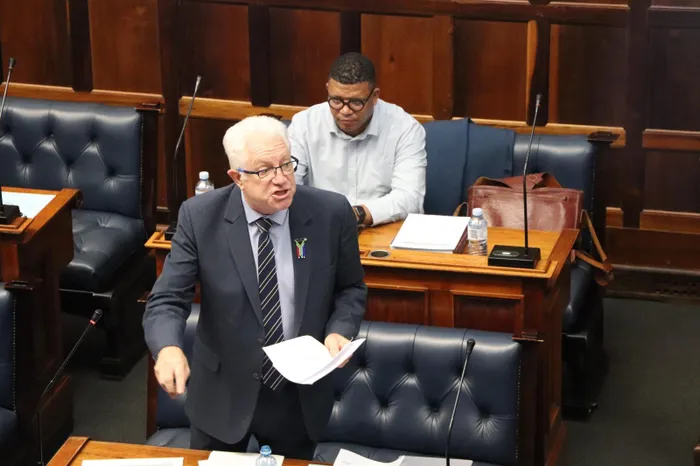Battle to unseal Western Cape police-gang links report

Premier Alan Winde has repeatedly refused to make public the report into alleged capture of police in the Western Cape.
Image: Western Cape government/Supplied
WESTERN Cape Premier Alan Winde has been given until Friday to either release the full Police Ombudsman report into links between police and gangs to the public; or a comprehensive, redacted version that omits all personal identifiers but fully discloses its findings, conclusions, and systemic recommendations.
The Cape Crime Crisis Coalition (C4) this week expressed outrage over the “continued suppression” of the report, questioning whether Winde was playing politics with people’s lives. The organisation has not ruled out taking legal action against Winde should he fail to release the report.
Winde announced the launch of an investigation in 2022 after Western Cape High Court Judge Daniel Thulare indicated in his judgment that there was evidence suggesting senior SAPS management in the province had been infiltrated by the 28s gang.
Upon receiving the ombudsman’s report, Winde refused to make it public, despite mounting calls for transparency and suggestions to have it redacted.
“This critical document and its findings no doubt cut to the very heart of the public's distrust and the collapse of confidence in the police and other law enforcement agencies tasked with our protection.
“Its release becomes even more relevant and urgent in the light of the unfolding evidence and revelations in the Madlanga Commission of Inquiry and the parallel Parliamentary hearings into the goings on in SAPS. Despite the grave public interest in the findings, and the urgent need for public accountability, Premier Winde refuses to release it,” the organisation wrote in a statement.
Approached on the matter, Winde’s spokesperson, Regan Thaw said: “The Premier personally called Dr McMaster yesterday afternoon and explained to him in detail the reasons why the ombudsman's report cannot be made. Dr McMaster was grateful for the call and explanation provided.”
However, C4 chairperson Dr Llewellyn MacMaster said they still wanted the report.
Winde would not provide reasons given to McMaster for not releasing the report or why he would not explain his reasons to the public.
Speaking on radio on Tuesday, Winde said: “General Reddy investigated and reported back to me. First of all there are a number of police at a provincial level in the SAPS as well as the law enforcement level at a municipal level that were at risk because of this case. I do not think it's fair to make it public, I think that would be irresponsible. I asked the ombudsman whether we could conduct a commission of inquiry, the report came back that it was not the right way to go. It would not give us anything substantial in this case as the case itself was locked up tight.”
The organisation wrote Winde a letter on Tuesday, saying: “We note your publicly stated reason for this refusal: to protect the law enforcement officers named in the report. Despite your reasons, we are not persuaded. We urge you to immediately release the full report or a redacted but substantive version thereof. While we acknowledge the principle of protecting individuals from unsubstantiated allegations, we must question whether this reason, in its current absolute form, is valid, proportionate, and ultimately in the public interest.
“You state that releasing the report would endanger SAPS and Metro law enforcement officers. However, the public interest in understanding the nature, extent, and systemic patterns of this alleged collusion is overwhelming. The public has a right to know if the institutions tasked with their protection have been compromised. The question must be asked: does protecting a relatively small number of named individuals justify withholding information that is critical to the safety and constitutional rights of millions of law-abiding citizens?”
The coalition noted that Winde’s approach suggested that the report was an “all-or-nothing” document but this was not a "credible position".
"The core content of the report, its analysis and its prescribed remedies, can and must be separated from the identities of specific individuals. Your refusal to do so implies that the report's contents are so damning that even a redacted version would be untenable, which only deepens public suspicion and distrust.”
Cape Times
Related Topics: